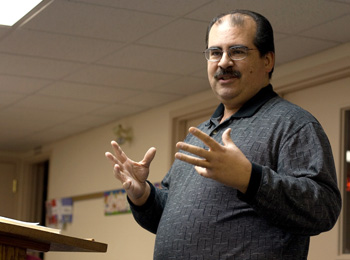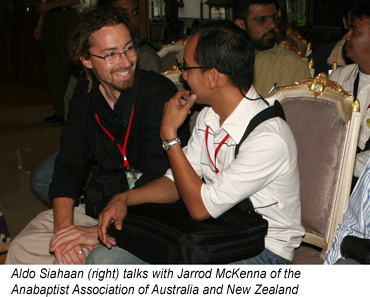 |
Over 250 junior high youth, in grades sixth through eighth, participated in the annual Junior High Lock-In held on Friday night into Saturday morning, March 14-15, at Christopher Dock Mennonite High School. The theme of this year’s event was “Be a bucket filler!” taken from Galatians 5:13-15. During |  |
| the event, which ran from 9 p.m. to 7 a.m., the youth brought tons of energy for the variety of activities held, a mountain of snacks and drinks for the night and an over-flowing suitcase full of children’s vitamins to donate to the MAMA Project’s ongoing outreach in Honduras. | ||
|
|
||
Intersections
Celebrating a donation of time: Working to alleviate poverty
Scenes from the Junior High Lock In…
Intersections March 2008

(click the header to read all stories)
Read the articles online:
- A gift plain and simple: Encouraging each other to live out grace– Bruce Eglinton-Woods
- The house is being built– Noel Santiago
- Historic peace churches meet in Indonesia: What is peace in our land?– Aldo Siahaan
- From Zimbabwe to Pennsylvania and back: Extending the blessing– Renee Gehman
- Global shared convictions series: The love of God comes wearing skin– Blaine Detwiler
- About faith, grace, fear and a whole range of emotions: “I thought I was the most unqualified person”– Gary Parmer
- Building relationships: Bridging culture and community– Elaine A. Moyer
- A reflection from the Honduras trip– Marlene Frankenfield
- Called to a Mission in Marketing: Encouraging shopping with a conscience– Brenda Oelschlager
- Wanted: Ideas for Ministry– C. Conrad Martin
![]()
Click to View/download the printable PDF
A gift plain and simple: Encouraging each other to live out grace
The house is being built
Noel Santiago, Executive Minister
nsantiago@mosaicmennonites.org
Grace… Peace… Blessing… Love… Goodness… Relationships… Encouragement… Ministry…
 Almost sounds like the list found in Galatians on the fruit of the Spirit, doesn’t it?
Almost sounds like the list found in Galatians on the fruit of the Spirit, doesn’t it?
God indeed is doing a new thing in our midst. Those who have gone before us have been faithful and their legacy of faithfulness continues to live today.
The prophet Haggai (2:9) once said, “The glory of this present house will be greater than the glory of the former house… And in this place I will grant peace….”
In these pages of Intersections we once again capture the “the glory of this present house” the Lord is building among us. This house is built upon the foundation of Jesus Christ, for truly no other foundation can be laid.
• As grace is experienced through becoming communities of grace, the house is being built.
• As peace is being sought in places of religious pluralism, poverty and injustice, the house is being built.
• As blessing is extended materially, spiritually and emotionally, the house is being built.
• As love shows up in unexpected skin, the house is being built.
• As God’s goodness comes in a way totally unexpected and a ‘yes’ is said, the house is being built.
• As relationships are forged across miles and cultures, the house is being built.
• As encouragement comes to help people through conscientious shopping, the house is being built.
• As ministry ideas are encouraged and offers to assist are made, the house is being built.
The house of God, a place of habitation where the glory of the Lord can shine forth, is being built among us!
 In these pages you will get a glimpse of the house of glory being built through the lives, stories, works and words of those who write. The future looks bright, there is much to hope for even in the midst of a broken and dying world.
In these pages you will get a glimpse of the house of glory being built through the lives, stories, works and words of those who write. The future looks bright, there is much to hope for even in the midst of a broken and dying world.
May you be built up in your inner being – the temple of the Holy Spirit – as you read the story of God’s movement in our midst. Blessings.
Historic peace churches meet in Indonesia: What is peace in our land?
Aldo Siahaan, Philadelphia Praise Center
siahaan22@gmail.com
 Pastors, leaders and activists from Church of the Brethren, Mennonite, Brethren in ChristQuaker and congregations from around the world came together in December in Solo, Indonesia. Participants came from as far as Australia, Japan, India and the United States. The theme for the conference was “Peace In Our Land: In the Asian Context of Religious Pluralism, Poverty and Injustice.”
Pastors, leaders and activists from Church of the Brethren, Mennonite, Brethren in ChristQuaker and congregations from around the world came together in December in Solo, Indonesia. Participants came from as far as Australia, Japan, India and the United States. The theme for the conference was “Peace In Our Land: In the Asian Context of Religious Pluralism, Poverty and Injustice.”
On the opening day of the conference, Mesach Krisetya, from the Indonesian Mennonite conference Gereja Kristen Muria Indonesia (GKMI) , challenged participants to sacrifice our comfort and wealth for others who are existing in less fortunate situtations than our own. Basing his theme on Isaiah 2:1-5, he asked us, “What do you bring before God, war-ship or worship?”
 One testimony about poverty in India–where the big issue is mass suicide, especially by women, because they don’t know the answer to their financial problems–became a difficult and engaging topic in group discussion. One group asked, “How can we as Christians be a community of love and practice the economics of love in a global economy?”
One testimony about poverty in India–where the big issue is mass suicide, especially by women, because they don’t know the answer to their financial problems–became a difficult and engaging topic in group discussion. One group asked, “How can we as Christians be a community of love and practice the economics of love in a global economy?”
Not only did we hear from many speakers, we also allowed God to speak to us. We sang and knelt down together in prayer, and tried to hear God’s voice.
After a few days of meetings we went to Surakarta Palace, located in the city of Solo, and had a chance to meet with the siblings of the sultan, or king, of Indonesia. We planted a Sawo Kecik tree seed in the palace garden, symbolizing planting the virtues for gaining peace. The king replaced the trees surrounding the palace with this kind of tree as a symbolic work to share the openness, calling on all religions to plant their virtues and goodness in the earth.
One of the messages from this conference was that of St. Francis of Assisi, who said, “If you desire peace with your lips, make sure it is written first in your heart.”
Do we truly love our enemies? Do we pray for those who persecute us (Matthew 5:43-44)? Sometimes I wonder: what is peace if I know there are so many people killed by gun violence?
What is peace if I know many Christians are being persecuted? What is peace if I know so many of my Indonesian friends in Philadelphia live in fear because of their immigration status? Sometimes I feel helpless.
 One day God reminded me of a story from the Gospel about a boy who had five loaves of bread and two fish, who gave everything without asking any questions. He did his part and God did God’s part by multiplying it. What God wants from me is just to give everything that I have to make peace and have peace with others, especially those who need it most. It is like God is saying to me, “Aldo, you do your part, full-hearted and trust me, I’ll do My part.” I thank God for my helplessness.
One day God reminded me of a story from the Gospel about a boy who had five loaves of bread and two fish, who gave everything without asking any questions. He did his part and God did God’s part by multiplying it. What God wants from me is just to give everything that I have to make peace and have peace with others, especially those who need it most. It is like God is saying to me, “Aldo, you do your part, full-hearted and trust me, I’ll do My part.” I thank God for my helplessness.

